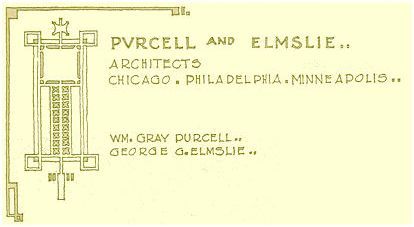 |
firm active: 1907-1921 minneapolis, minnesota :: chicago, illinois |
Hattie McIndoe residence, project
Purcell, Feick and Elmslie
Rhinelander, Wisconsin 1911
Text by William Gray Purcell
Parabiographies entry, Volume for 1911
Job Date (in Parabiographies): 1911
Dwelling for Miss Hattie McIndoe, Rhinelander
One O. Henry Missed
Miss McIndoe was a very modern business woman of Rhinelander, Wisconsin. D. F. Recker told us that Hattie McIndoe's father was an old tobacco-chewing pioneer lumberman of Rhinelander, who longed for a son to carry on his hard-boiled business tradition, but Fate sent him a daughter.
He said that McIndoe, not being accustomed to being thwarted in any of his plans, raised little Hattie like a boy, and when she was old enough to go into business, he didn't take her in simply as a sort of secretary or lady employee, but put her through the hoops in every aspect of his business until he felt that he had actually produced the hard-boiled business man that he had always intended to have in his longed-for son.
Fate was having a good-natured laugh at the whole performance because Hattie was in every way a very feminine creature. The result was a split personality, with unceasing conflict between that Hattie who was a darling girl with a fluffy-ruffles, illogical mentality and bubbling emotions, and the Hattie whose language, gestures, and surface deportment expressed the atmosphere of small town business. The result was one of the most amusing and unpredictable combinations of personality that I have ever met.
Picture Problem
Well, Hattie wanted a grand house and never did we have a more difficult time organizing something that would satisfy her. Indeed, it was practically impossible to find out how she lived, what she wanted, or who was going to live with her. It seemed as if she had never really lived in a house in any conscious sense, just tagged around after her father. Finally, in trying to draw her out with pictures when we were unable to secure an idea from her, we showed her that famous little River Forest house of Frank Lloyd Wright's and that took her fancy exactly. The plan, she thought, was just what she wanted, and in despair of ever projecting a building for her against any practical needs or ideas of her own, and not wishing to lose this commission and a profitable piece of business, we started Miss Parker making quarter-scale drawings of such a house type.
We used certain general appearance features of the Wright house as a focus to distract Hattie's attention and began reintegrating the whole affair. As we proceeded, Hattie began to accumulate ideas, talking with her friends and through the "practical" ideas of her father when progress drawings were sent for her approval. The old man was very wealthy, so apparently the question of cost did not enter. He seemed to think the design satisfactory. While Hattie didn't know what she wanted, she wanted whatever it was when she wanted it, and was accustomed to having her way. She was so busy acting her part as the modern business woman that she omitted to set any cost limit on the project, and asked us for no quotation of fees.
When George Herman and Son, of Rhinelander, gave her a figure of around twelve thousand dollars, she took the first train and came into our office one evening a a quarter to five. She was hopping mad.
When she had blown off the pressure, which didn't take long, we got down to particulars. She wanted to quit entirely. Very good, "for work done so far you owe us this sum"--around two hundred and seventy-five dollars--a very modest sum which we had expended on the drawings. She was too stunned at the cost to even make a reply. Mr. Elmslie sat on a stool at his draughting table and hardly looked around. He said he was protecting me. She filled out a check and silently left the office, leaving her roll of blueprints behind--and that was the last of Hattie.
Collection: William Gray Purcell Papers, Northwest Architectural Archives, University of Minnesota [AR:B4d1.5]